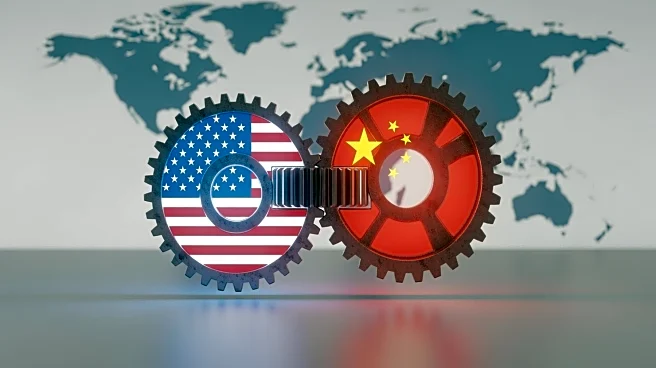What's Happening?
The United States has undergone a significant shift in its strategy toward China over the past decade, moving away from the belief that engaging Beijing would lead to liberalization and integration into
a U.S.-led world order. This change was initiated during President Trump's administration and largely maintained by the Biden administration, leading to a bipartisan consensus on a more hawkish stance toward China. Despite expectations of a Cold War-like posture, the current administration has taken a softer approach on issues such as TikTok, semiconductor export controls, and Taiwan. The shift in strategy coincides with a broader crisis of self-belief in America, marked by public doubt in the nation's strength and competence, which has weakened the ability to unite around strategic objectives.
Why It's Important?
The shift in U.S. strategy toward China is crucial as it reflects broader challenges in American foreign policy and national self-perception. The lack of a 'Sputnik moment' of national awakening has hindered the ability to mobilize resources and sustain efforts in great-power competition. This has implications for U.S. sovereignty, deterrence strategies, and economic independence, particularly in strategic sectors like pharmaceuticals and minerals. The crisis of self-belief affects the nation's ability to project power and maintain its global leadership role, potentially impacting its ability to effectively compete with China in technological and industrial domains.
What's Next?
U.S. policymakers are encouraged to focus on modest goals tied to domestic renewal, such as reducing dependence on China for critical resources and securing a significant share of leading-edge chip manufacturing. There is a need for stronger investment in defense and strategic technological sectors to preserve advantages and catch up where necessary. The current mood of doubt and division may persist, requiring a sustainable strategy for competition that works amid these challenges. Leaders must make a persuasive case for stronger investment in hard power and cultivate faith in America's capacity to achieve significant objectives.
Beyond the Headlines
The deeper implications of the U.S. strategy shift toward China include ethical and cultural dimensions, as the crisis of self-belief reflects broader societal issues. The erosion of public trust and the rise of isolationism and self-loathing challenge the nation's ability to unite around causes and define clear objectives. This could lead to long-term shifts in U.S. foreign policy and its role in global affairs, as well as impact domestic political dynamics.









